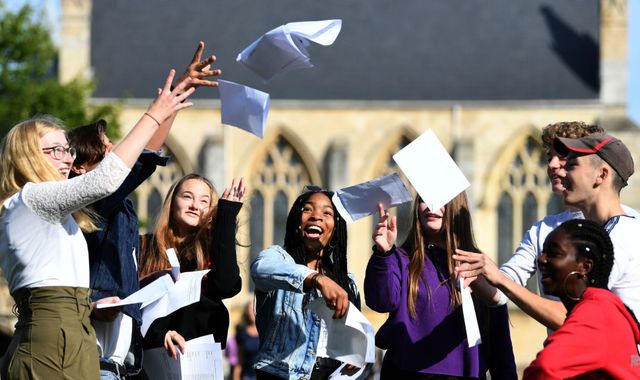GCSE results: Proportion of pupils getting top grades in ‘tougher’ subjects rises
Written by News on 22/08/2019
The proportion of pupils getting the top GCSE grades has risen slightly for a second year in a row.


Just over one in five (20.8%) got an A/7 or above, up from 20.5% last year and the highest since 2015.
A total of 67.3% got a C/4 equivalent grade or above, up from 66.9%, also the highest since 2015.
The 1-9 classification now used in England means a 7-9 score is similar to an old A or A*, while the 4-6 band broadly corresponds with C and B grades.
The 1-3 bracket covers the old G-D grades.
Girls still lead boys at the A/7 level by 6.5 percentage points, but the gap at C/4 has narrowed from 9.1 points to 8.8.
In English, 62% of entries got a C/4 or above – up from 61.8% the year before. For maths it was 59.6% – up from 59.4%.
This is the second year of students taking the government’s toughened-up exams, with less coursework and more exams at the end of the two-year period.
Under the new system, fewer pupils should receive the top grade of a 9 because it is intended to allow for more differentiation among the brightest students.
Exams regulator Ofqual says 837 pupils in England still managed to get a clean sweep of nines when taking seven or more GCSEs – just 0.1% of students.
The changes to GCSEs have proved controversial however, with concerns that less able students are suffering because courses are now harder.
A poll by the Association of School and College Leaders (ASCL) of 554 members in England found eight in 10 thought they were having a negative effect on struggling students.
Geoff Barton, ASCL general secretary, said the reformed GCSEs had “sacrificed the interests of the most vulnerable students for the supposed benefits of raising the bar for the most able students”.
One assistant headteacher said: “These have been designed without a thought for low prior attaining or SEN students.
“I cannot think of anything more dispiriting than going through school thinking every day ‘I cannot do this’ – but that is the reality for many students.”
Former education secretary Michael Gove began the reforms when he was education secretary.
In 2014, he said the new courses “set higher expectations” and “demand more from all students and specifically provide a further challenge to those aiming to achieve top grades”.
A Department for Education spokeswoman said: “Exams are an essential part of ensuring that young people have acquired the knowledge and skills they need, but should never be at the expense of a young person’s wellbeing.”
Try our GCSE quiz
(c) Sky News 2019: GCSE results: Proportion of pupils getting top grades in ‘tougher’ subjects rises







